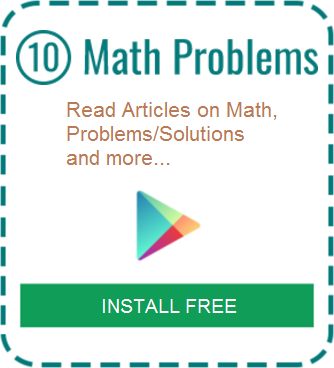
Set | Set Notation | Types of Sets
A set is the collection of well defined items or objects. The term
‘well defined objects’ is meant for those objects or members which we can
identify or pick up from the given collection. If we can not identify or pick
up the objects or members from the given collection, then it is not a well
defined collection and hence not a set.
********************
10 Math Problems officially announces the release of Quick Math Solver and 10 Math Problems, Apps on Google Play Store for students around the world.
********************
********************
Here are some examples of the set given in the pictures below:
The objects of a set are called members or elements of the
set.
Some
examples of well defined collections:
i. The collection of odd numbers less than 10.
ii. The collection of first 5 letters of the
English alphabet.
And,
not well defined collections:
i. The collection of tall students in your
class.
ii. The collection of difficult problems in
mathematics.
Set Notation
Sets are denoted by the capital letters of the English
alphabets A, B, C, D, … etc. The objects which form a set are called the
members or elements of that set. The members or elements of a set are separated
by commas (,) and enclosed in curly brackets { }. Here are some examples of
sets.
i. V = {a, e, I, o, u}
ii. F = {Factors of 18}
iii. Z = {wild animals}
In the above example (i), the element e lies in the set V,
we write e ∈ V,
but m is not in V, we write m ∉ V.
Thus the symbol ∈ and ∉ are used for the element belonging to
and not belonging to the set.
Types of sets
According to the numbers of elements, there are four
different types of sets:
1. Empty (Null) set: A set having no elements is
called an empty or null set. For example, A = {Set of boys having 3 legs}, B =
{Set of natural numbers less than 1} etc. It is denoted by ∅ or { }.
2. Singleton (Unit) set: A set having only one
element is called a singleton or unit set. For example, P = {5}, Q = {The set
of highest peak of the mountains in the world} etc.
3. Finite set: A set having a finite
number of elements is called a finite set. For example, M = {2, 3, 5, 7}, N =
{a, b, c, ………, x, y, z} etc.
4. Infinite set: A set having infinite
number of elements is called an infinite set. For example, set of whole numbers
W = {0, 1, 2, 3, ………}, set of even numbers E = {2, 4, 6, 8, ………} etc.
Workout Examples
Example 1: Identify which of the following sets are finite,
infinite, null or singleton sets.
a. A = {A set of months which start with J}
b. B = {Set of odd numbers}
c. C = { Set of factors of 12}
d. D = {A set of multiples of 4 less than 50}
e. E = {A set of natural numbers between 2 and 3}
f. F = {A set of animals with one horn}
g. G = { A set of even prime numbers}
Solution:
a. Finite set
b. Infinite set
c. Finite set
d. Finite set
e. Empty set
f. Singleton set
g. Singleton set
You can comment your questions or problems
regarding the set, set notation or types of sets here.





0 comments: